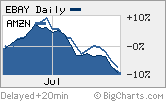
NEW YORK (CNN/Money) -
It isn't Christmas in July for e-tailing stocks.
Both eBay (EBAY: Research, Estimates) and Amazon.com (AMZN: Research, Estimates) are both expected to report extremely strong second-quarter results later this week. Even so, shares of the two online commerce giants have fallen 15 percent since the beginning of the month.
They're not alone either.
Blue Nile (NILE: Research, Estimates), an online jeweler that went public in May, has dropped 13 percent in July. Online closeout retailer Overstock.com (OSTK: Research, Estimates) is down 17.5 percent.
Then there's Netflix (NFLX: Research, Estimates). Despite reporting a more than 90 percent jump in second quarter revenues last week, the online DVD rental company's stock has been a bigger bomb than that King Arthur movie. Shares have plunged nearly 43 percent.
What gives? It appears that the online retailing sector is getting a welcome dose of reality.
Investors have learned two important lessons about investing. Few companies are impervious to changing macroeconomic trends, especially retailers. And valuations matter.
Premium P/Es and rising rates don't mix
Let's address the first issue. Discount retailers Wal-Mart Stores (WMT: Research, Estimates) and Target (TGT: Research, Estimates) both reported disappointing June sales earlier this month. And the Commerce Department said that overall retail sales in June fell 1.1 percent.
The U.S. consumer has been fairly resilient for the past few years. So any sign of weak retail sales has to be a concern for e-commerce companies. No matter how much faster they are growing compared to their brick and mortar peers, they are still dependent on a healthy outlook for consumer spending.
 |
|
| It has been a cruel summer for eBay and Amazon.com investors. |
"The biggest thing that hovers over online retailing stocks is offline retail data," said Mark Mahaney, an analyst with American Technology Research.
Sure, eBay, because of its unique business niche, may be slightly less susceptible to economic shifts than Amazon or Overstock. But the key words are "slightly less." That's not the same as immune.
"I don't think anybody is concerned that eBay is going to fall apart," said Martin Pyykkonen, an analyst with Janco Partners. "But there could be a lack of buyers if interest rates keep going up and consumers are more concerned about credit card debt."
| Related stories
|

|
|
|
|
That brings us to valuations. Because there appear to be more fundamental risks going forward, that makes premium earnings multiples for consumer cyclical stocks harder to swallow.
Even after this month's pullback, eBay, with a market value of $52 billion, still trades at 50 times 2005 earnings estimates while Amazon, with a market cap of $19 billion, has a P/E of 34 based on next year's earnings projections.
What's more, based on the way the market reacted to Netflix's earnings report, not to mention strong results from Internet media titan Yahoo! (YHOO: Research, Estimates) earlier this month, it seems as if investors in richly valued Internet stocks need to be awed by earnings.
Meeting or slightly beating expectations is not enough. Companies have to substantially raise their earnings and sales targets for the third quarter as well.
See you in September?
Since the second and third quarters are usually fairly weak for retailers, it's hard to imagine either eBay or Amazon beating earnings and revenue estimates or boosting guidance by a wide enough margin to excite Wall Street.
| Recently in Tech Biz
|

|
|
|
|
"E-commerce stocks give me cause for concern," said Michael Mahoney, managing director with EGM Capital, a hedge fund that focuses on tech stocks. "Because Yahoo! came in just at expectations, investors punished the whole group."
Mahoney said the one exception in the sector is Netflix, which he has bought following its precipitous drop.
The company's pullback has been so severe that shares now trade at just 16 times 2005 earnings estimates, a valuation that Mahoney said is reasonable given his expectations of 30 percent to 40 percent annual earnings growth for the next few years.
Still, shares of all online commerce companies may tread water, at best, for the next few months. In fact, these stocks have tended to slump in the summer and then take off in late September in anticipation of strong fourth-quarter sales.
Given the recent concerns about sluggish retail sales, Pyykkonen said it pays for investors to be patient. It's more important to have a clearer picture of how much consumers are willing to spend in November and December, as opposed to August and September.
"Nobody's going to buy these stocks on third quarter guidance and numbers," Pyykkonen said.
Analysts quoted in this piece do not own shares of the companies mentioned and their firms have no investment banking ties to the companies.
Sign up to receive the Tech Investor column by e-mail.
Plus, see more tech commentary and get the latest tech news.

|

